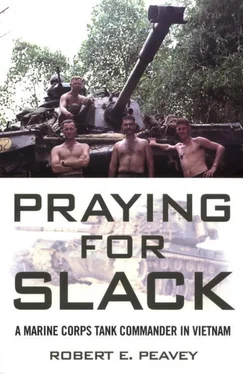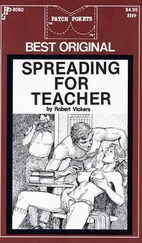“Here they come!” I yelled to my crew. I got on the radio and alerted my other tank that the Doggies were on their way.
The sound grew louder. Soon it became obvious that substantial numbers of vehicles were approaching. Their noise increased until finally they passed our position, halfway into the surf, the same way we traveled the beach. The ground vibrated as ten tanks and an equal number of APCs (armored personnel carriers) thundered by, each vehicle throwing up a rooster tail of water.
The Army crews waved to us, as if they were out for a sightseeing tour. We could only turn our heads, glance at one another, and look back in amazement as they roared by, going full out. They’re going to get a tour, all right, I thought to myself.
We hadn’t seen this many armored vehicles in one gathering since leaving the States. It was just like the Army to do everything on a colossal scale—a sledgehammer to kill a mosquito. But there was a hint of envy on all of our minds, for here was armor being used decisively and not in a support role, as we typically were. These vehicles were not encumbered by slow, walking grunts; their grunts were riding on top of the APCs. Unfortunately, this was the wrong place and the wrong war for such foolishness; someone was leading armor as if he was on the plains of Europe.
I called down to my gunner to get me a beer while I pulled out an old ratty lawn chair from the gypsy rack and set it up on the armor plate over the tank’s engine. Truitt handed me up a beer, and I gave him my camera. I wanted a photographic record of the hardest operation I’d ever be on—and one that I expected would be the shortest.
Bob Steele, the loader, spread out a blanket and joined me on the back of the tank. I sat in my lawn chair, feet up on the gypsy rack, and beer in hand when Truitt snapped my picture.
As the tail end of the armored column finally passed us, we witnessed a sight that left us totally speechless. The column, which had been heading north into the DMZ, suddenly changed direction without warning. As if on a parade field performing close-order drill, each vehicle made a 90-degree turn to the left, so that the entire column was now moving on line across the Z.
For the second time that morning, the four of us looked at one another, shaking our heads in amazement.
“I don’t believe these guys,” I said.
“They ain’t gonna get far now,” said Truitt.
“Charlie will fix their arrogant ass,” I told him.
The first explosion occurred some one hundred meters from the ocean’s surf or about twenty seconds after their stunning flanking maneuver. A minute later came a second explosion, as one of the tanks tried to come to the aid of the first victim.
The third explosion was smaller, but took out one of the Army crewmen inspecting the damage to his tank. (Secretly, I hoped it was the major.)
The fourth explosion was another antipersonnel mine, stepped on by the Army medic running to aid the wounded man. In three minutes, the Army’s armor operation had turned into a cluster fuck.
Our attention was next drawn to the sound of a helicopter approaching over the dunes. It was easy to recognize an Army chopper, thanks to the large red crosses in white squares painted on the bird’s sides, belly, and nose. Only the Army troubled to paint its medevacs that way, as if they expected to be granted some immunity from Mr. Charles. Hell, Charlie was an equal-opportunity shooter. Years earlier, we Marines had learned not to bother, a fat red cross on a brilliant white field only helped Charlie to aim.
We had learned three things about the Army: One, they were really good at parade maneuvers; two, they sure could get a medevac in a hurry; and three, as I already knew, they didn’t know how to listen.
An hour passed while the Army crews worked on the two damaged tanks, tiptoeing around them in fear of finding more mines. Finally, hours after the mission came to a halt, all twenty vehicles cranked up their engines, came alive again, and moved out—in reverse. They didn’t want to risk hitting any more mines by turning around; they hoped to extricate themselves by backing over the tracks they had left coming in. Once back in the surf, they performed another brilliant display of close-order drill, a simultaneous left turn in tandem, and began their full-speed retreat south down the beach.
On this return trip, however, there was no grinning or waving of hands. They ignored the taunting and mocking laughter of Oceanview’s two Marine tank crews, as we stood on our art—nor plate giving them the finger. They wouldn’t even turn their heads in our direction. Like dogs with their tails between their legs, they pretended they never saw us as they looked straight ahead.Yeah, that was the day the Army showed us how to fight the war on the DMZ.
So that our radio messages wouldn’t reveal too much to any enemy eavesdropper, the military used code words or phrases. I don’t think some of them fooled anybody; they actually described what we were trying to hide better than its actual name would. For example, “fist movers” were jet fighters.
These substitutions were changed only rarely throughout the entire war. Often they became part of our everyday language. “Arc Light,” the code name for a B-52 bombing mission, became a universal term throughout Vietnam. Other things were often identified or spelled out by their phonetic alphabet names. Over the radio, it was easy to mix up the many similar-sounding letters like B, C, D, E, and G that all end in an ee sound. Replacing a letter with a word eliminated that problem. The international phonetic alphabet, developed for NATO countries and still in use today, was a set of words that corresponded to each letter of the alphabet.
Often these letter-words became names all by themselves. For example, the four companies in a Marine battalion would be identified by four consecutive letters—A, B, C, and D. But you never called them by their letter-names, as in Bee Company or Dee Company. Instead, you called them by their phonetic alphabet designations: Alpha Company, Bravo Company, Charlie, Delta, Echo, and so on. This practice, universal throughout all the armed services, was an effective way of eliminating errors that could be caused by static, people’s accents, and particularly noisy surroundings.
In fact, the phonetic alphabet was responsible for how our IndoChinese foe got his nickname. It all began during the late 1950s, when guerrillas calling themselves the Viet Cong first tried to overthrow the South Vietnamese government. American military advisors quickly shortened their name to its initials, VC. Over the radio, though, you wouldn’t say “Vee Cee,” but instead used the phonetic alphabet equivalent, or “Victor Charlie.” Because radio procedure required that words be short and concise, Victor Charlie became simply “Charlie.”
As the war progressed from a guerrilla uprising to an all-out invasion from the North, it became necessary to differentiate the local VC from the professional North Vietnamese Army—or NVA—troops. Often, for expediency, we referred to both enemies as “Charlie,” but we sometimes called the NVA “Mister Charles” as a sign of respect. Professional courtesy, if you will.
Now that I was up north, I had to get used to a few new terms. Down south around Da Nang, for example, tanks were referred to as “kings” or “beetles” over the radio. Up north, we called them “tigers.” Actually I liked the new term better—it was closer to how we really thought of ourselves.
WE RECEIVED ORDERS TO MOVE NORTH of Dong Ha and link up with a grunt unit for a sweep near the Z, somewhere northwest of Con Thien. I was the section leader in charge of three tanks when I got the order to move west on Highway 9 and make contact with a battalion of the 9th Marines.
Читать дальше












